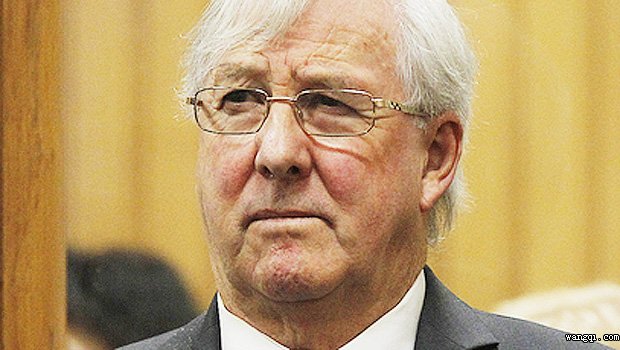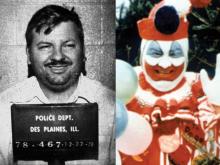
Menzies Hallett
For 33 years, Menzies Hallett got away with murder because a New Zealand law prohibited Hallett’s wife from testifying against him without his permission.
by Lisa Agnes
By all accounts, Menzies Hallett was an affable, confident family man who got along with everyone. Yet it only took one anxiety-laden night in mid 1979 for this persona to dramatically unravel, revealing a conflicted, angry man.
New Zealand, in 1979, was not a place known for random acts of violence. The volcanic plateau situated in the middle of the North Island offered stable employment opportunities and a relatively idyllic way of life. But crimes motivated by passionate emotions can explode anywhere. On August 16, Hallett received a letter from his estranged wife denying him custody of their two daughters, prompting him to ring her and threaten to "come down and sort it out."
According to a friend who was with Hallett at the house of his girlfriend later that evening, Hallett had a revolver tucked into the waistbelt of his trousers. At one point, he pointed to a ceramic pot in the kitchen and asked his girlfriend, Margaret Culkin, whether she valued it. Before she could answer he had drawn the pistol and fired, missed, then fired again, destroying the pot and leaving his girlfriend reeling. "I remember there was the television there and I think I collapsed over it," she said. "I didn't know what was going on. I was in shock." Hallett then left in his Ford Falcon 500, intent on some kind of showdown.
A Cold-Blooded Murder
At approximately the same time, some 50 km away, Constable Michael Sullivan was drinking a cup of coffee with his Maori friend, 31-year-old Rodney Tahu, at the Turangi Shell station. Tahu was in sole charge of the service station and, when Sullivan left, it was likely he did not have another customer before closing up and activating the alarm at 1 am. As he was preparing to go home, Menzies Hallett pulled into the forecourt, needing oil for his vehicle after noticing a noise in the engine. According to the confession Hallett made to his wife hours later, Tahu told him that the service station was closed. Hallett replied that was "ridiculous," but when Tahu reiterated the fact, Hallett called him a "black bastard," reached for his gun and aimed it at the man.
Tahu ran off between the petrol pumps and Hallett's first shot missed. However, a second shot caught him in the shoulder and he slumped to the ground. Hallett then walked over and fired for a third time, the gun muzzle just centimetres from his victim's head. Leaving Tahu for dead, Hallett turned around and drove off, back the way he had come.
Tahu's friend Constable Sullivan was among the first to the scene, finding him spread-eagled in a pool of blood on the concrete. An ambulance duly arrived and rushed him to Taumarunui Hospital. Despite paramedics' best efforts, Rodney Tahu died at 5.42 a.m.
Within 24 hours, Menzies Hallett had confessed to his wife, Susan Sharpe, describing how he had been angry at her letter, had been on his way to “get the truth” from their daughter in Palmerston North, and that he had been at a “flash point.” He even showed her the pistol he had used in the killing, flinging it onto the bed in front of her. Eventually he left the house and Ms. Sharpe rang her lawyer, who alerted the police. Meanwhile Hallett took a meandering route back to Taupo, where police were already waiting. Upon seeing the police cars, Hallett made a U-turn. The police pursued.
During a stand-off at a road block, where Hallett remained in his stationary car, a shot rang out. Members of New Zealand's Armed Defenders' Squad moved forward en masse to retrieve him, injured from a self-inflicted gunshot wound. He was then taken to hospital and later charged with murder. Two months later, he appeared before the courts.
Justice Denied by the Evidence Act
And this is where the story becomes a bit unbelievable. The law at the time prevented a spouse from testifying unless she had permission to do so, meaning Susan Sharpe could not tell the court what she knew. The magistrate thereby ruled that there was not enough evidence to warrant putting Hallett on trial. And, for the next 33 years, Menzies Hallett effectively got away with murder. Adding insult to injury was the fact than everyone in the general area knew he had committed the crime and were dismayed by this travesty of justice. "He strolled around town as if nothing happened, it was like water off a duck's back, but the whole town knew," says a former aquaintence.
Some regarded Hallett as having a screw loose, rather than as a murderer, remembering him as a "good talker," "a colourful character," "a bit loud after a few drinks," and "unhinged." "There was something a bit creepy about him," a former real estate employer said. "He dressed and talked nicely but, if I had known his past, I wouldn't have given him a job." Now, Hallett apparently could not walk into the yacht club of which he had been a member for years without being ridiculed and tormented, according to club member Brian Garlick. This treatment eventually forced him to move to Rotorua, less than two hours' drive from the location of the murder. "I'm surprised he didn't move further away," Mr Garlick said. "We were all intrigued as to why he wasn't brought to justice."
During his years of freedom, Hallett worked around Rotorua as an insurance agent and a real estate agent. He married Shona Watts in the 1980s, but divorced her a few years later. Watts's brother, Gary, has said that there was some indication of Hallett's character before they married. "My nephew, who was from Taupo, he told Shona before they got married that he had a bit of a shady history, so they must have had a fair idea."
Not long after divorcing Shona, Hallett met his current wife, Joan, an ex-pat Englishwoman working as a theater nurse. Joan has consistantly refused to comment to media.
It was the year 2006 before the Evidence Act changed the outdated notion that marital confidences were “so essential to the preservation of the marriage relationship as to outweigh the disadvantages to the administration of justice which the privilege entails” and it was the year 2011 by the time justice caught up with Menzies Hallett.
The Arrest and Trial
Police investigators spent a year building their case, then approached Hallett as he was shopping in Rotorua township. Shortly after his arrest, he told The Dominion Post newspaper that he knew nothing of the shooting, professing to have "no inkling" as to why he had been arrested. "I've had a two-hour battle with police trying to get me to admit all sorts of things, feeding me all sorts of misinformation," he went on. "I have no idea why he (Tahu) was shot. He was in the wrong place at the wrong time." Police, though, only ever had one suspect from the outset.
At his trial, the now 72-year-old Hallett remained calm and outwardly amenable. In direct contrast to what he had told The Dominion Post, he denied murder but admitted pulling the trigger that killed Rodney Tahu. Yet, in a last-minute about-turn, he retracted that statement, implying that he no longer accepted it was he who had pulled the trigger. This meant that the jury had to decide not only whether the killing was manslaughter or murder, but that the man who pulled the trigger was, beyond reasonable doubt, Menzies Hallett.
However, the prosecution had several people who had learned the truth directly from Hallett over the years to testify against him, including Susan Sharpe. All had the same story. Hallett had confessed in an apparent unburdening of the guilt that had begun to eat away at him. One former colleague who visited him in the court cells during proceedings said that "there was only one word that sprung to mind and that was just that he looked a little resigned." And resigned he should have been. After nearly 34 years, time and the Evidence Act 2006 had caught up with Menzies Hallett. After a two-and-a-half week trial at Rotorua's High Court, the jury took only two hours and 45 minutes, including a lunch break, to find him guilty of murder.
The police were justifiably pleased. Rex Hawkins, now retired, was one of the men who initially arrested Hallett after the stand-off at the road block. His words echo other officers' sentiments: "Living with the knowledge for 33 years of who the offender was, and not being able to place him before the court, has been difficult. Having seen the pain and hurt the family suffered, it's been very frustrating to know of the admission Hallett made to his ex-wife, knowing that this wasn't able to be used by the prosecution, and me knowing he was the killer. So it's a real relief to see his conviction at long last and I hope it brings some satisfaction to the Tahu family and gives them some closure on this part of the tragic story."
Tahu family spokesman Colin Hair has said that "the hardest part is we've always known who was responsible for this. It was only an anomaly in the law that allowed it to go by, and I've got to say, on behalf of the whole family, a huge thanks to the police for their tenacious work and not just the work of the current people; the original outstanding work that was done by them back in 1979 which enabled this to come together to its conclusion today. We've had wonderful support from a lot of people."
Sentencing
On July 12, 2013, Menzies Hallett was sentenced to life in prison. Although a minimum non-parole term could not be imposed because, in 1979, such a sentence was not allowed under the law, Hallett will serve at least 10 years before becoming eligible for parole.








